Mikhail Gorbachev, last leader of Soviet Union, dead at 91
Mikhail Gorbachev, the final leader of the Soviet Union who brought in reforms credited with ending the Cold War, died Tuesday. He was 91.
Gorbachev died after a long illness, Moscow’s Central Clinical Hospital said in a statement. No other details were given.
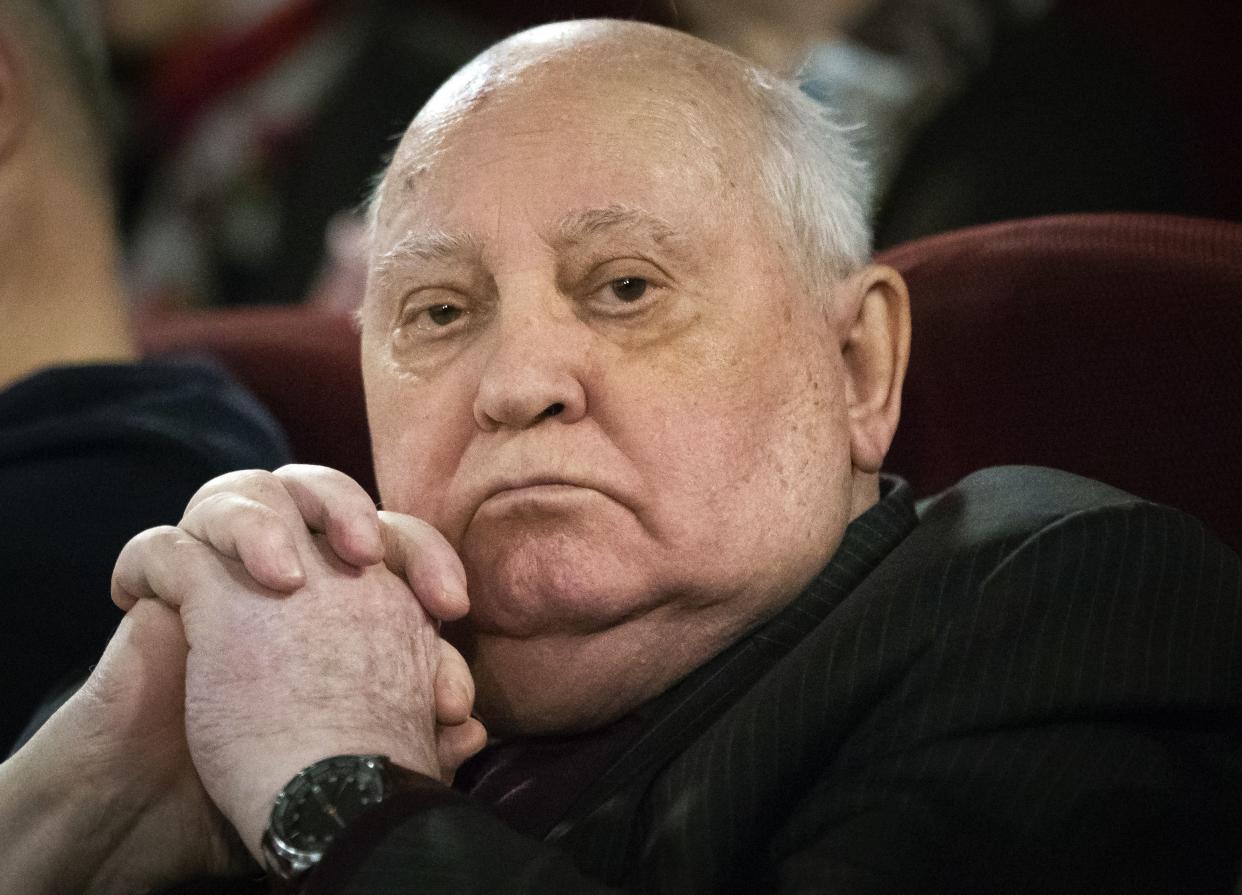
In this Thursday, Nov. 8, 2018 file photo, former Soviet leader Mikhail Gorbachev attends the Moscow premier of a film made by Werner Herzog and British filmmaker Andre Singer based on their conversations, in Moscow, Russia. (Alexander Zemlianichenko/)
The eighth and last leader of the Soviet Union, Gorbachev is often credited with opening up the closed-off power through his policies of “glasnost” [openness] and “perestroika” [restructuring]. He ruled the U.S.S.R. from 1985 to 1991, when the union dissolved despite his efforts to keep it together.
Gorbachev was controversially awarded the Nobel Peace Prize in 1990 for his work to change the Soviet Union and soften relations between the Eastern and Western worlds — including the key city of Berlin, half of which was long under Soviet control.
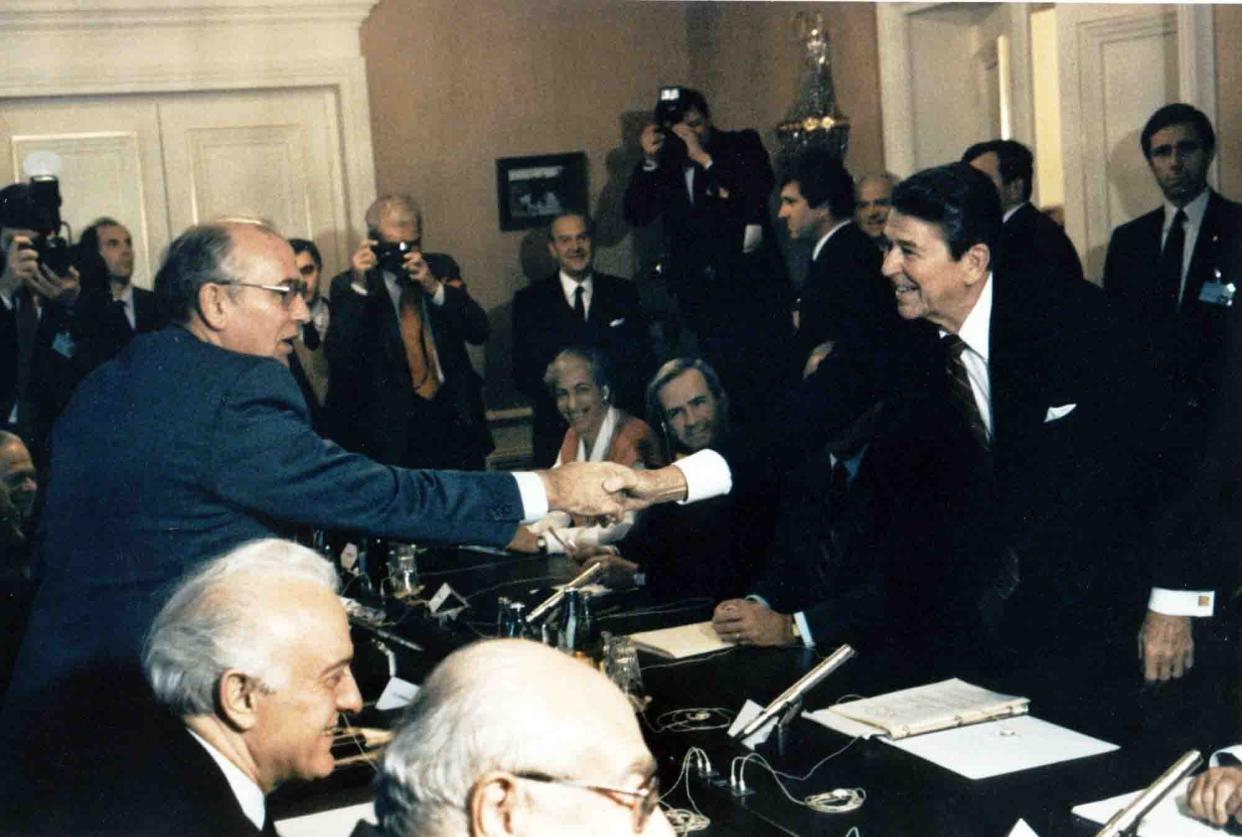
Soviet leader Mikhail Gorbachev, left, shakes hands with U.S. President Ronald Reagan at the Geneva conference in November 1985.
Former President Ronald Reagan famously asked Gorbachev to “tear down this wall” dividing Berlin, and the hated barrier fell in November 1989.
Russians largely take a less charitable view of Gorbachev, who’s often thought of as the man who sabotaged the empire from the inside and diminished Russia’s position on the global stage.
Gorbachev met with Reagan and his successor, George H.W. Bush, 12 times in six years. He attended more Soviet-U.S. summits than any other U.S.S.R. leader.
Gorbachev was also credited with ending the country’s disastrous occupation of Afghanistan in 1989. That same year, unlike previous Soviet leaders, he didn’t send in troops when anti-Communist movements rose up in Eastern European countries seeking to break away from the U.S.S.R.
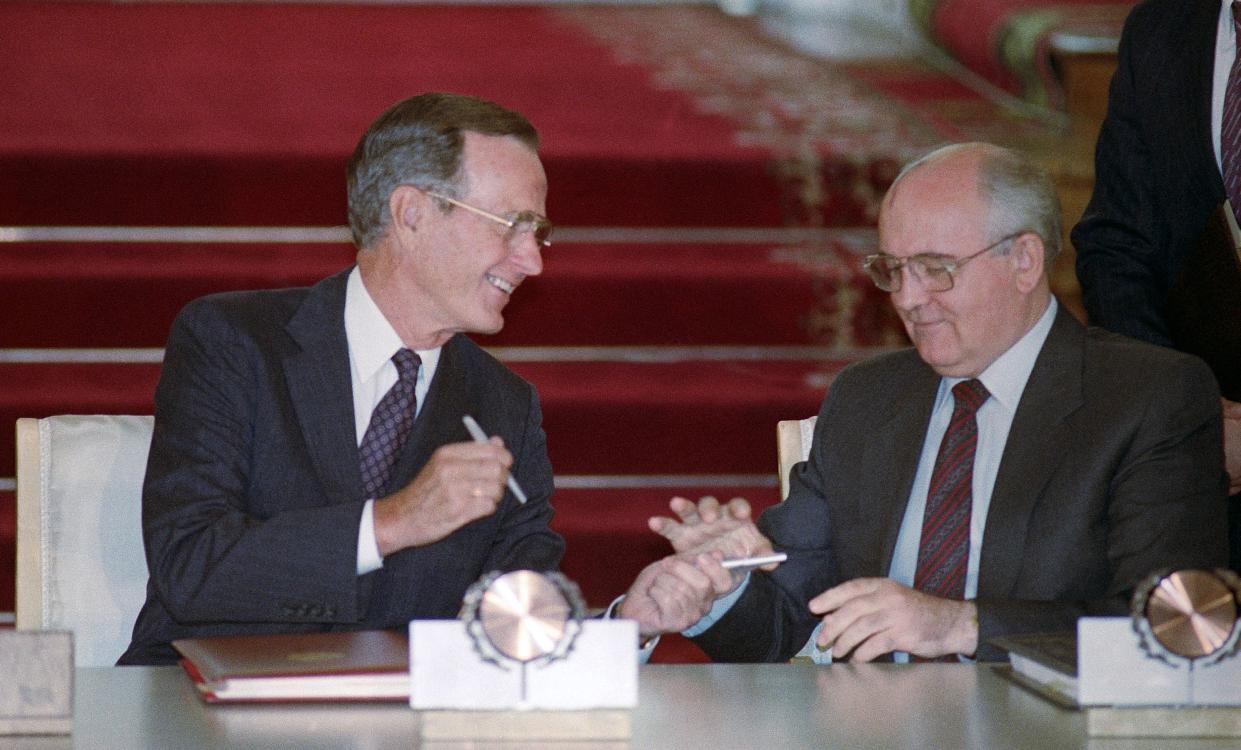
FILE - In this file photo taken Wednesday, Aug. 1, 1991, U.S. President George H. Bush and Soviet President Mikhail Gorbachev exchange pens after signing the START arms reduction treaty in the Kremlin, Moscow. (Boris Yurchenko/)
“Steering a peaceful course is not easy in a country where generation after generation of people were led to believe that those who have power or force could throw those who dissent or disagree out of politics or even in jail,” Gorbachev said in his Nobel Peace Prize acceptance speech.
Born March 2, 1931, to peasants in the southern Russian village of Privolnoye, Gorbachev joined the Communist Party as a teenager and began working his way through the ranks. He became a regional party leader in the 1970s and joined the mighty Politburo, the top authority in the U.S.S.R., in 1979.
It was a rapid rise from there to the top of the party. After Leonid Brezhnev, Yuri Andropov and Konstantin Chernenko died in quick succession, Gorbachev was chosen for the Soviet Union’s top job.
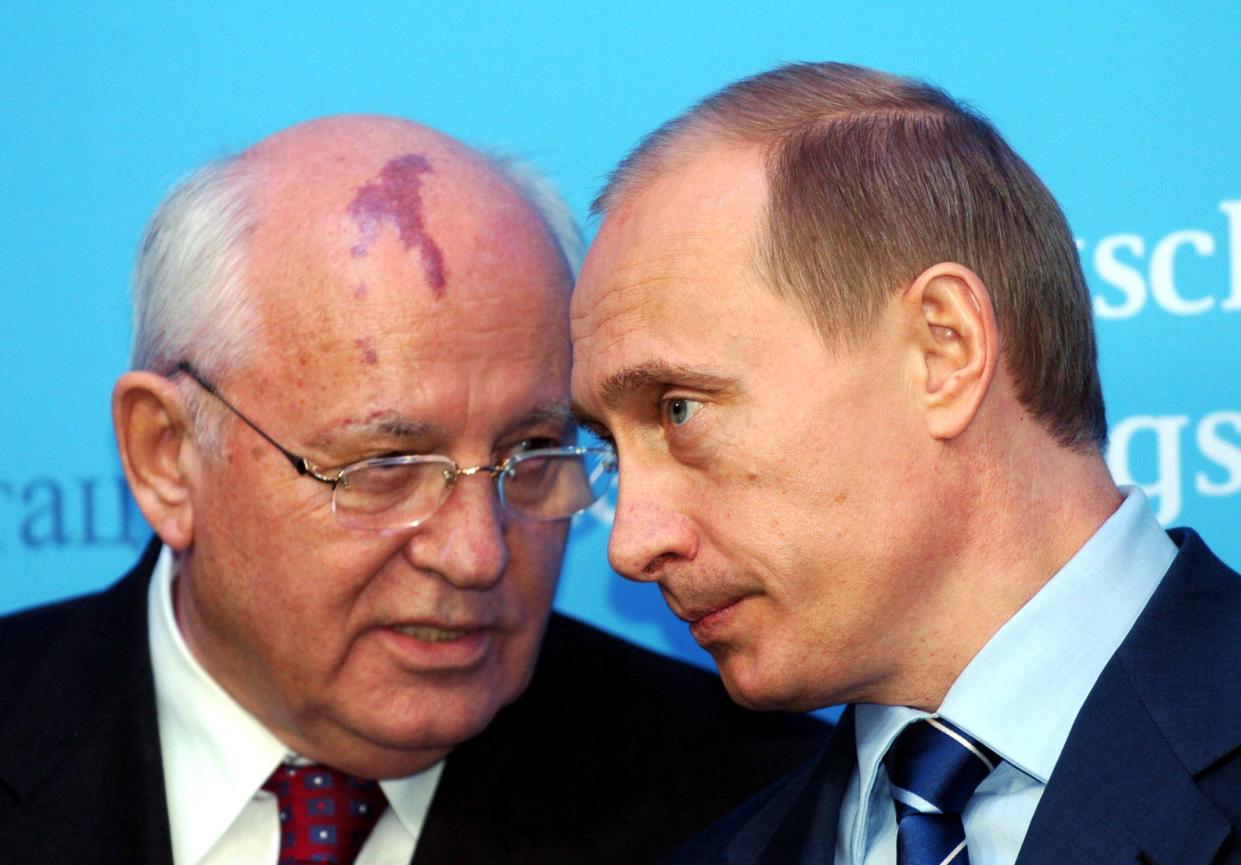
Russia's President Vladimir Putin, right, talks with former Soviet President Mikhail Gorbachev at the start of a news conference at the Castle of Gottorf in Schleswig, northern Germany, Tuesday, Dec. 21, 2004. (Carsten Rehder/)
He quickly got to work changing how things were done behind the Iron Curtain. He remodeled the Politburo to give himself cover and instituted a number of reforms. The old guard may have disliked his decisions, but he made a strong case for change that was only bolstered after the Chernobyl disaster in 1986 demonstrated the shakiness of Soviet infrastructure.
“The nuclear age forcefully demands a new approach to international relations, the pooling of efforts of states with different social systems for the sake of putting an end to the disastrous arms race and of a radical improvement of the world political climate,” he said in a postdisaster speech.
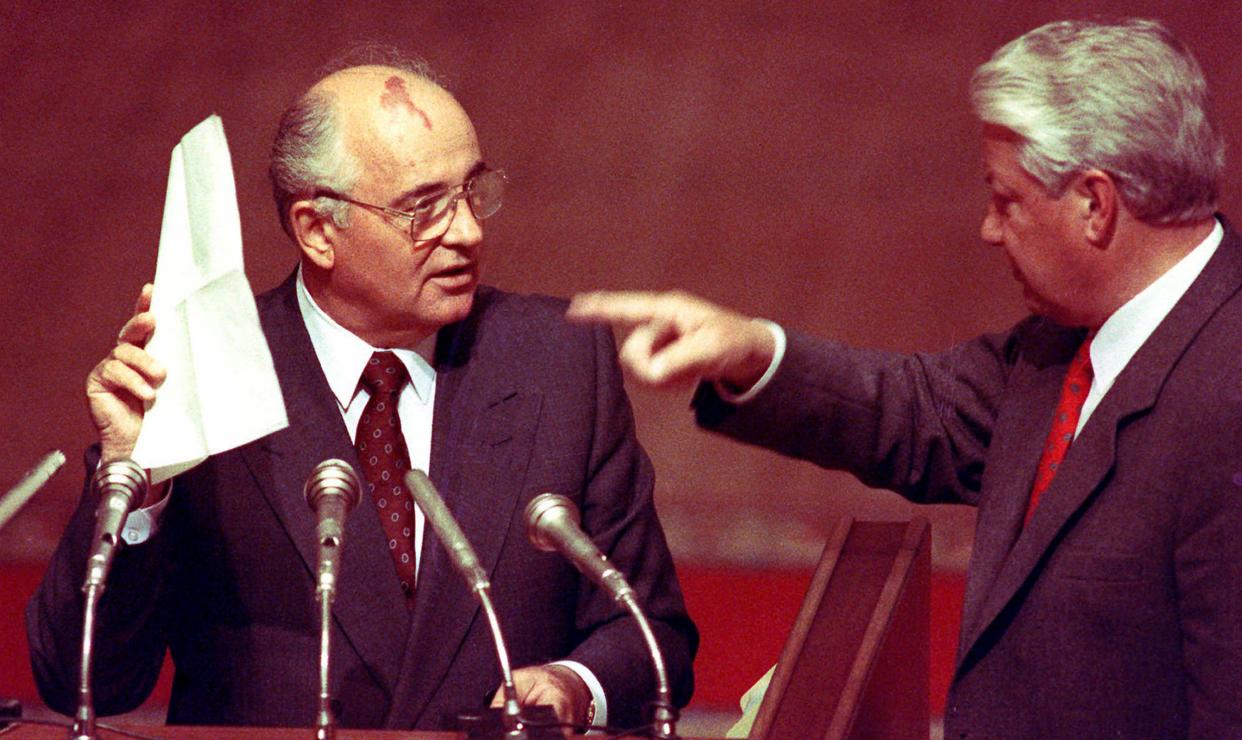
In this Friday, Aug. 23, 1991 file photo, Soviet President Mikhail Gorbachev, left, holds stenographic notes given to him by Russian Federation President Boris Yeltsin, right, at a special session of the Russian Federation Parliament. (Boris Yurchenko/)
Gorbachev enabled everyday people to speak their minds in the Soviet Union, a stark change from previous oppressive conditions. He also restructured Russia’s political system to allow for hints of democracy.
But Soviet hard-liners were not so easily defeated. Angered by the revolutions of 1989 and other actions, they organized a coup against Gorbachev in August 1991. Though Gorbachev physically survived the attempt, his political power was crushed. Boris Yeltsin, who defiantly spoke out against the plotters, became the chief figure in Russian politics and eventually the first president of Russia.
“I support the preservation of the union state and the integrity of [the U.S.S.R.],” Gorbachev said in his resignation address, which marked the formal dissolution of the Soviet Union. “The developments took a different course.”
With News Wire Services
